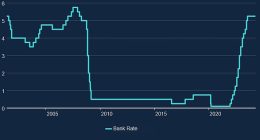
June 22, 2021 7 min read
Opinions expressed by Entrepreneur contributors are their own.
If you want to be a successful entrepreneur, Jeffrey Nicholson believes you have to be selective. Nicholson is the co-founder and CEO of Tracer, a data-intelligence platform that recently closed a $9.9 million seed investment round. Prior to creating Tracer, he was the Chief Media Officer at VaynerMedia. He also serves on the advisory boards for Roku, Pinterest and Nextdoor. He created his education startup, NicholNotes, to improve the education ecosystem and shape future leaders. Nicholson sat down with Jessica Abo to talk about how Tracer bridges the growing gap between sets of data and how being selective can help you be more successful.
Jessica Abo: Can you start by telling us a little bit about your career?
Jeffrey Nicholson: I went to business school at Babson College. Honestly, it changed my life. I was always very good at math and fell into finance, but I just didn’t love it. I didn’t have the passion for it and didn’t feel like it was going to be my career. Then I stumbled upon running ads on Google and really took that and ran with it. I’ve spent the last 15 years in the media and technology space honing my skills and growing businesses, and I couldn’t feel more blessed about what I’ve been doing.
What was the problem that you were trying to solve when you came up with this idea to create Tracer?
The problem is really disparate datasets. If you think about a very simple data equation for any business, they are spending money on Google, Facebook and maybe they use Shopify for their website. None of those companies talk to each other, and you consistently run into the problem where dataset one plus dataset two plus dataset three is the answer you need, but they don’t make it easy to put those things together. I experienced that over and over, whether I was at an agency or running a brand myself, so I decided to solve the problem and build my own technology.
Where were you in your career when you came up with this idea?
I was working at a company called SocialCode, and we, at the time, were one of the largest Facebook advertisers in the United States. Disparate datasets had been a consistent problem that I had run into in my career. Companies have to deal with data from television, Google, Facebook, Shopify and all these different companies and publishers, as well as revenue streams, and there’s no glue in between. There’s no one considering the client’s best interest and saying, “Here is all your data. Here’s how to contextualize it. Here’s how to draw insights on what you have at your disposal.”
I honestly got fed up with trying to combat that with humans and Excel and decided to build my own technology with my business partner, Leighton Welch. I then moved on to work with Gary Vaynerchuk at VaynerMedia, where I was not only running the media department but was also incubating Tracer inside the company. I give Gary a lot of credit for honestly entertaining the idea of even backing me, because it was pretty adventurous.
I came on as the Global Chief Media Officer to run the media department and build a media structure that was as successful as Gary’s creative agency, but then I pitched him on the idea of simultaneously incubating a technology company, because I knew we were going to run into the problem again. I had come from a previous media company where you had one of three choices: You had to buy someone else’s technology, you had to fight the problem with humans and Excel or you had to build your own technology. I started to go down the third path, and Gary very graciously has backed the business. I think it’s worked out quite well for both of us.
Being selective is really important to you and it’s played a very big role in your business strategy. What does being selective look like for you?
I think the biggest thing is really appreciating that you have to drive value. A lot of people are so in a rush to sell something and make money that they don’t remember that your reputation is attached to what you sell. So, we really believe in reputation management and focusing on clients that are mutually valuable to each other, making sure that I deliver on that promise. Rather than sell 1,000 clients, I would rather sell 100 and do a great job and never lose one.
What does this look like from Tracer’s perspective? What are some examples of how you’ve been selective in this company?
We don’t have a sales or marketing team. We don’t advertise. Other than this week and spending time with you and a few other people, we’ve never even done PR. So first and foremost, we’ve taken a very different approach to growth. The second thing is, when we’re potentially engaging a future client, we go through a diagnosis together on how both firms are going to work together. We ask: Is that going to be successful? And then we create a roadmap that matches our procurement contract.
From end-to-end and how we operate, we really try to identify if we can add value, and I’m happy to be honest with the client and say, “Hey, I don’t think we’re the right fit for you,” whatever the reason may be, because I’d rather only sell to someone that I’m going to drive value for and be successful with, than try to really fit a square peg into a round hole.
For the new entrepreneurs out there, it might be really overwhelming to turn down potential business. What do you want to say to that person who is just getting going?
I think you have to know yourself and your business, first and foremost. Everyone’s going to take a different strategy. Mine is unique to my business partner, Tracer, and us. But I tell most people to trust their gut. Understand that you have to trust your instincts. Especially as the co-founder or founder of a business, you’re going to have to live and die on your decisions. So, I think you have to have faith in those things and make sure that you try to execute to the 100th percentile of what you pick, but don’t be afraid to go a different path. I had a lot of people tell me that I was wrong in a variety of different scenarios throughout my career, and I’d rather live on what I choose and try to win and lose on that.
What is your overall advice for the entrepreneurs out there who might be listening to you and not be sure what the best thing is to do next to advance their company?
My tagline is “show me the energy.” I want to see and feel the fact that you want it. A lot of people like to talk. Very few people want to work 80 hours a week. So, show me the energy, the effort, and the work ethic in order to be successful. And be naturally curious. You have to want to solve problems. You have to want to learn and grow, and you have to be open to new things as well. It’s those two combinations that really will deliver great success for any entrepreneur.









